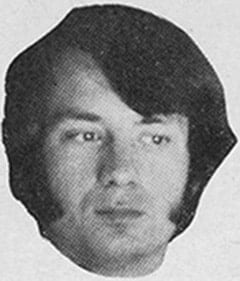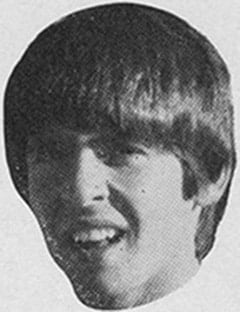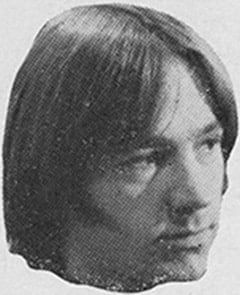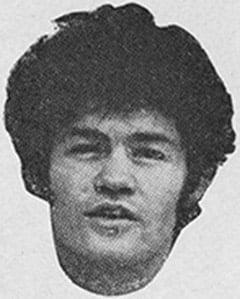We left the Monkees last month in what could be called a quandary. They’d been invited to show themselves off to programme sponsors at a big get-together at a plush Hollywood restaurant shortly after they had been formed—long before they actually hit the screens in the in-series. But the strange fact is, the boys didn’t want to go on.
They reckoned that it would be a particularly stupid form of suicide to perform a sketch that had been specially written for them, so they just fooled around, Micky, for instance, pretended to shave with a microphone and also caused chaos by switching off all the restaurant lights.
Davy did his now celebrated impersonation of Donald Duck. Mike looked fed up with the whole thing. And Peter pulled more faces in the shortest possible time than even he’d managed in the past.
Their zaniness only appealed to a few, Most of the other big-business sobersides felt the boys were just being smart-aleck kids.
And one big official said: “That’s the Monkees? Forget it…”
Now it’s worth stressing that all this was ages and ages before the Monkee series proper was to get on the nation’s screens. The idea of the zany group was there, the first inklings of how the scripts would go, but in America you don’t go ahead with an expensive television idea unless you’re sure that somebody is going to buy it… sponsor it, in fact. So this chatteringly chaotic night in that restaurant was really pretty important.
Important Permalink
And perhaps the most important aspect was that the newspapers got hold of the whole story. The original idea was to keep the Monkees “under wraps” until the producers were good and ready. Now this is all very fair and okay. After all, if you have a big personality which you want to explode at a certain time, then you want to hold your publicity until exactly the right moment.
In this story, we don’t want to keep harping on those age-old arguments about how the Monkees started, but we must recall that they were originally picked for their acting and performing abilities not so much for their vocal and instrumental talents. Don Kirshner, the head of Screen Gems, saw the boys as actors but it was also his job to get them to create an actual group sound… because it was decided even this early that the television series would be introduced by a disc release… just to get the public talking about the boys.
Too early Permalink
But the papers picked up the story rather too early. One can’t blame them because there was one incident OUTSIDE that restaurant that created more than a little interest. On their way to that “audition-type” show, the Monkees had collected a stuffed peacock—and insisted on playing their own game of volley-ball with it outside in the street. Amazed passers-by started phoning in the story to the local papers and in no time at all it seemed the whole press set-up was interested in finding out more about the boys…
So, long before it had originally been planned, something had to be done about the Monkees. Mr. Kirshner was the guy in charge of the musical side. He let the boys loose in a studio and listened to how they sounded when playing guitars and drums… and just singing. How DID they sound?” Kirshner has told us: “It wasn’t the right sort of sound. I wanted a sort of musical sex image sound and these boys were giving me a pulsating, hard-driving modern sound.”
Now before you start thinking that Mr. Kirshner was obviously some kind of nut remember that the boys had had little chance of working together as a musical unit. Mr. Kirshner also felt that Davy’s voice was better suited to musical comedy: that Mike had perhaps the weakest singing voice of the four and that Micky was clearly the best bet to take the lead on that first record “Last Train to Clarksville”.
When you look back now you wonder just how wrong anyone can be!
On that now historic record, Davy and Peter provided a bit of the backing harmony with Micky taking the lead part.
So, as the boys have said, the original Monkees’ sound was helped by studio musicians, and a strong song from the youthful team of Tommy Boyce and Bobby Hart… and a whole lot of faith on the part of the record company. However, things were really happening on the television scene…
The boys worked day and night on the first few episodes. But because of the chaos of that night at Chasen’s Restaurant, at least five key television stations refused to pick up the series. This affected the early ratings, obviously, but on the other stations the Monkees, through sheer force of personality and their zaniness, became an almost instant national cult.
Their first record stayed near the top of the charts for ages and the television ratings at least reached the bottom half of the all-important Nielson charts. And, naturally, the Press wanted to know more about Davy and Peter, Mike and Micky. Now this is where we reach a vital part of the story… and a part that shows just how much the boys have had to put up with in their driving run to world-wide stardom.
For the newspapermen were not welcome at the studios mainly because some of the bosses were afraid that they’d come up with all sorts of wrongly angled reports on the boy’s first records. One paper reported: “Writers were being treated like Russian spies and that immediately made them think that they were trying to hide something big on the Monkees’ lot.”
Of course the story was bound to leak out. The New York Times printed one of the biggest pieces on the facts behind that first hit record. Because people had tried to hush it up, they gave the facts, pure and simple… but the boys had barely a chance to put across the point that they WERE pretty good musicians even at that time but simply had not had the chance to put in enough time in the recording studio.
Let down Permalink
Of course the Monkees felt pretty let down over this. They knew that they had a lot of talent, built on long-time experience, but here they were—national stars, but knowing that they had been put in a rather false position. The thing had snowballed and they felt in danger of being left in the cold. What’s more, some of the studio bosses knew that they could easily explode into anger as a group… for the boys already felt the power they’d got, what with having sold six million singles and eight million albums by mid-way through that first season of television shows.
And, just for the record, the boys were not seeing a great deal of the money coming in. Around this time, just about the time when the Monkees series started in Britain, Mike Nesmith was saying in a particularly intense interview: “We must get more power over what we’re doing on records. We can only be what we are and I know that we have a lot of talent, but it has to be put across in our way. We must make our own sounds in music…”
Of course those of us who saw them in concerts last time they were over will realise that those problems are now far behind them. They have created their own individual sound and have made some splendid records—in terms of originality.
They were using stand-ins for their music on the TV shows. They listened with anger as the industry spoke with pride of the Beatles and the Mamas and the Papas and other big-time groups—yet at that time nobody mentioned the Monkees, even though they were outselling just about everybody. They were regarded at this time as “TV stars who also produce music” and this obviously hit hard at their personal sense of pride.
There was one way they could prove their point. That was to get on tour, get on stages where they couldn’t possibly be accused of using stand-ins. Then turn on the sheer power that the boys knew they had inside them and so gain a bigger share of approval and applause from within the industry.
They managed that just fine ’n dandy. But not before there was a very dramatic showdown… more about that next month.







